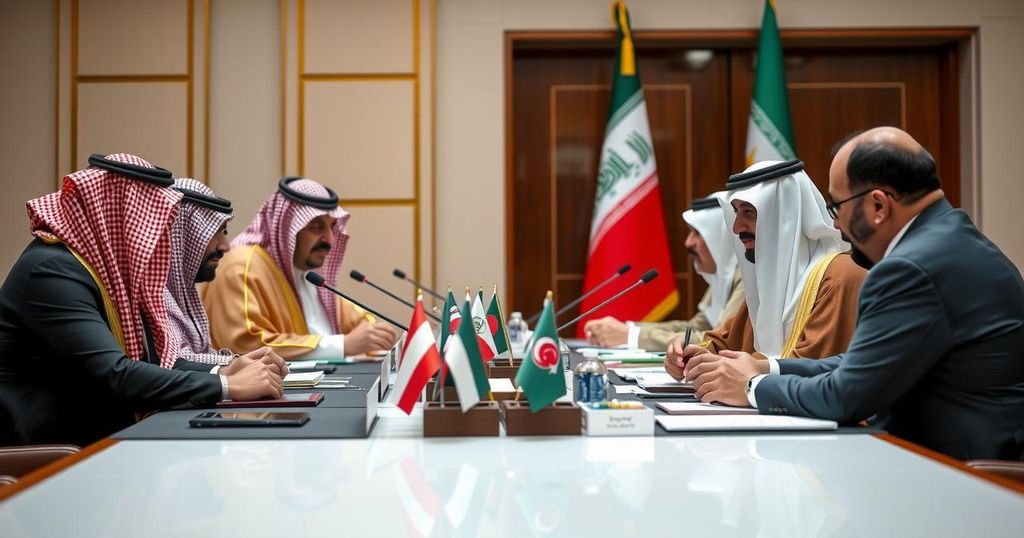Top diplomats from Western nations and the Middle East met in Riyadh to discuss Syria’s future following President al-Assad’s ouster. Key topics included potential sanctions relief to facilitate humanitarian aid and support the newly established governance by Hayat Tahrir al-Sham (HTS). The meeting highlighted a shift in diplomatic engagement regarding Syria’s political landscape and the need for international cooperation to restore stability in the region.
In a significant diplomatic gathering, top diplomats and foreign ministers from Western countries and the Middle East convened in Riyadh, Saudi Arabia, to discuss the future of Syria following the ouster of President Bashar al-Assad. This meeting marked the inaugural convening of such high-level officials in the region since the regime change, reflecting a shift in diplomatic engagement regarding Syrian issues. Syria’s newly appointed Foreign Minister, Asaad Hassan al-Shaibani, has been vocal in advocating for the lifting of longstanding sanctions that have impeded the country’s recovery efforts post-Assad.
Among the attendees were representatives from Saudi Arabia, Egypt, the United Arab Emirates, Qatar, Bahrain, Iraq, Jordan, Lebanon, and Turkiye, along with officials from the United States, Germany, and the United Kingdom. The conference’s agenda included discussions on potential sanctions relief aimed at fostering humanitarian assistance and supporting the new governance structure in Syria led by Hayat Tahrir al-Sham (HTS). Analysts suggest that Western nations, including the Biden administration, are considering moves toward easing sanctions, specifically on actions vital for economic recovery, such as payments to public sector workers and energy supply approvals. This shift is critical for stabilizing the war-torn nation and facilitating international funding flows.
The U.S. recently enacted a six-month exemption concerning sanctions on transactions with Syrian governing institutions in light of the recent political changes. Concurrently, Germany, Italy, and France have expressed intentions to advocate for the relaxation of European Union sanctions. Germany’s Foreign Minister Annalena Baerbock emphasized the need for continued sanctions against Assad’s allies who have played roles in war crimes throughout the conflict. The meeting also followed pertinent discussions held in Rome and Jordan, indicating a concerted effort by regional and global powers to navigate Syria’s complex political landscape and establish a framework for future relations and support.
This gathering of Western and Middle Eastern diplomats illustrates a crucial juncture in Syrian politics. Following the recent overthrow of President al-Assad after over a decade of civil war, international actors are reassessing their policies toward Syria. Sanctions imposed on the Syrian government have been a significant barrier to economic recovery and stability. The newly formed government led by HTS is advocating for the removal of these sanctions to re-establish normalcy, facilitate humanitarian aid, and encourage international investment necessary for rebuilding the nation. The context of this meeting is underscored by a history of complex geopolitical dynamics in the region, where the balance of power has shifted dramatically. The involvement of various countries reflects their individual interests in Syria’s future and their collective concern for regional stability, particularly in light of humanitarian crises stemming from prolonged conflict. The potential for altering sanctions policy indicates a willingness among some Western nations to engage more positively with Syria’s evolving political landscape.
In conclusion, the recent meeting in Saudi Arabia marked an essential step toward re-evaluating international policies regarding Syria in the wake of President Bashar al-Assad’s removal. Regional and Western diplomats are actively discussing possible sanctions relief and measures to facilitate humanitarian assistance and stabilize the new government. As Syria’s new administration seeks support and legitimacy, the outcome of these discussions will significantly influence the country’s recovery trajectory. The evolving political scenario indicates that international actors may be willing to adjust their positions to foster stability in a long-troubled region.
Original Source: www.aljazeera.com






